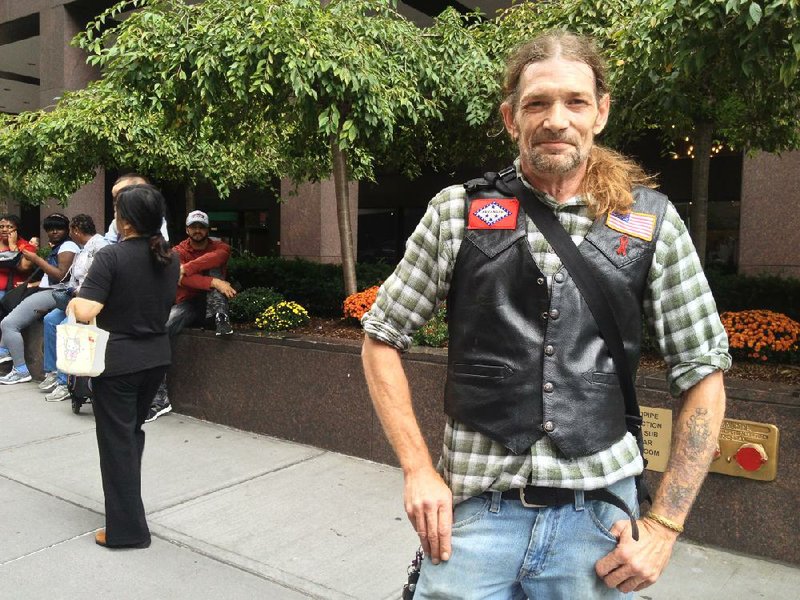WASHINGTON — Protests after Iranian President Mahmoud Ahmadinejad’s Wednesday speech at the United Nations sparked an international incident when a Fayetteville, Ark., man admittedly punched Iran’s deputy foreign minister, who was walking on the street outside the U.N. complex.
Greg Nelson, 50, said he’s made a trip from Arkansas to New York each year to protest the Iranian regime. When he saw the diplomat, Ramin Mehmanparast, walking near the protest with a phalanx of bodyguards, Nelson said he “got a little worked up.”
“I thought the guy was Ahmadinejad,” Nelson said. “I’ve always wanted to give him a piece of my mind, up close and face to face.”
Punching pedestrians is illegal in New York City. So is menacing, which occurs when a person “intentionally places or attempts to place another person in reasonable fear of physical injury.”
But Nelson was neither arrested nor detained.
After flying back to Arkansas on Wednesday night, Nelson downplayed the confrontation.
“It wasn’t much of a punch,” he said in an interview Thursday with the Arkansas Democrat-Gazette. “I threw a hook and caught him in the hip.”
He continued: “He was terrified. I had no intention of hurting him. I more than anything wanted to get his attention.”
Nelson, who goes by the name “Mountain Man” on an online profile, said he is producing a documentary on the National Council of Resistance of Iran. The council supports the Mujahedeen Khalq , or MEK, an Iranian resistance group which the U.S. State Department plans to take off of its list of terrorist organizations on Oct. 1.
Iran called the street confrontation a terrorist attack.
“There was an attack by MEK sect members,” Alireza Miryusefi, spokesman for Iran’s U.N. mission told Reuters. “MEK is going to be delisted from U.S. terrorist groups, and you can expect such aggressive behavior of a terrorist sect. The responsibility of protecting all diplomats is on behalf of the government of the USA.”
Nelson was featured in a story in the New York Daily News. Underneath a photo of Nelson, a bearded man wearing a leather vest with an Arkansas flag patch, the story began: “An Arkansas man landed a blow for democracy Wednesday — right to the gut of an Iranian official.”
In addition to the Daily News, other media outlets jumped on the story, including Reuters, The New York Times and The Associated Press, which posted several videos showing a seemingly confused and worried Mehmanparast meandering around a city intersection as a group of policemen attempted to get the crowd to back off.
Monica Gutierrez, a documentary filmmaker who captured the mob scene on tape, told the AP that the confrontation wasn’t violent. “They didn’t punch him or anything like that,” she said. “They might have shoved him.”
On one of the videos, protesters can be heard shouting: “He’s a terrorist. Get the terrorist.”
Before the incident, former New York Mayor Rudy Giuliani and former U.S. Speaker of the House Newt Gingrich rallied the protesters Wednesday, and the U.S. mission to the U.N. boycotted Ahmadinejad’s speech.
Paul Browne, the New York City Police Department’s deputy commissioner, said in a statement that Mehmanparast “was escorted away by the NYPD from an angry crowd who recognized him and was yelling at him in the vicinity of 48th Street and 2nd Avenue.”
Inside the United Nations complex, the United States, as the organization’s host country, has an obligation to protect foreign diplomats.
Outside, in the rest of Manhattan, it gets more complicated, according to Paul Webster Ware, a lecturer at Boston University who served as Great Britain’s ambassador to Cuba.
Ordinarily, foreign diplomats can expect protection when visiting abroad, according to the U.N. Convention on the Prevention and Punishment of Crimes against Internationally Protected Persons, including Diplomatic Agents, an agreement adopted by the General Assembly.
“Maybe somebody slipped up,” Hare said. “There was clearly some obligation to protect him.”
However, Hare cautioned that much of the incident is unknown. He said it was possible that the Iranian government chose to protect Mehmanparast with their own bodyguards, rather than involve the New York police.
Assigning responsibility for Mehmanparast’s protection is made more difficult, Ware said, because the United States and Iran do not have diplomatic relations.
Nelson, a man with Willie Nelson-style hair and an armful of tattoos, doesn’t spend a lot of time worrying about diplomatic niceties.
The Arkansas resident got involved in Iranian issues about 10 years ago after his wife died of breast cancer.
“I needed something to focus my life on to keep going, because I was devastated,” he said.
His friendship in Arkansas with an Iranian immigrant, Hooshang Nazrali, a former Madison County justice of the peace and current owner of a convenience store in Crosses, kindled an interest in Iran.
Nelson said Ahmadinejad should not be allowed on U.S. soil. Iran, he said, has made explosive devices and trained fighters trying to take on U.S. servicemen in Iraq.
Besides the fatalities, many have suffered brain trauma, he added.
Nelson said he suffered extensive brain damage from a car accident more than 10 years ago. As a result, he said, he feels a kinship with wounded veterans.
He also said he sometimes gets very passionate — like on Wednesday, when his emotions surged.
“I wish I hadn’t done that,” Nelson said. “I’m not a violent man. I got caught up in all the excitement.”
Front Section, Pages 1 on 09/28/2012

